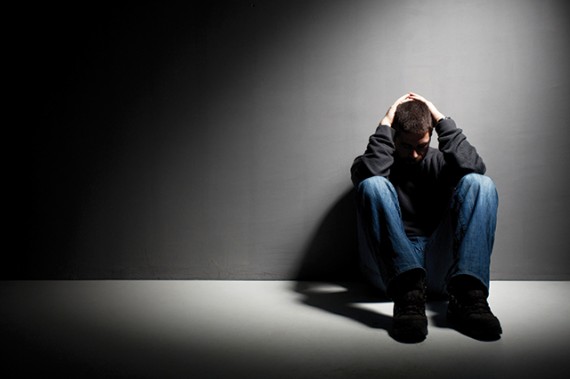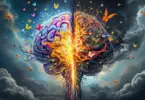By Phillip J. Watt
Guest writer for Wake Up World
At some stage of our lives we all experience emotional dysfunction to some degree, especially when we’re maturing. In some cases it may just be part of the learning curve as we grow into our more developed selves. Simple examples are that we might dwell on a problem too long, get upset or angry too easily, or think self-abusive thoughts consistently. For others it might impact us more significantly and even result in a form of mental illness.
Yet that isn’t to say that negative thoughts or feelings are dysfunctional. In the short term, experiencing negative thoughts and emotions is natural because we’re human and it is part of the human experience. Instead of that negativity being suppressed, when we give it the space to breathe, it voluntarily gives way to our fundamental philosophies and beliefs and more positive feelings. However, when we feel these emotions for ongoing periods of time it can have a detrimental impact on us and others.
Even though it’s important to productively feel all of our emotions, if we want to establish and maintain our inner peace, then we have no option but to overcome the emotional dysfunction plaguing our ego and sense of self.
[pro_ad_display_adzone id=”110028″]
For example, constantly being stressed, angry, sad, and jealous, or an array of other negative mind states, is emotional dysfunction. Rationales like “I’ve got a short fuse” or “I’m heartbroken” reflect self-destructive behaviour, especially when they occur over long periods of time. Anything negative that we continually maintain inside of us is inherently self-abuse. Unfortunately, these states of mind are generally considered normal and acceptable for people in our society, while we put little emphasis on the damage that these states have on our health and general wellbeing.
The reality is we have more control than we realise in how we feel. If we lined up 100 people and gave them each the exact same experience, even though there may be a vaguely similar emotional response, we would get 100 different ongoing reactions or responses. Why is this? Essentially it’s because there are factors which influence how we deal with the highs and lows that the rollercoaster of life takes us on. Those factors are our environmental influences. The biggest factor is our own free choice.
Following are 8 examples of self-harm that we sometimes choose to include in our individual states of mind, plus some tips to help us take control, overcome them and find our inner peace.
Emotional Patterns That Disturb Inner Peace
Feeling Unforgiving Towards Others
When we’re resentful towards others it’s usually because they have behaved hurtfully or broken our trust. But anyone who has felt like this (ie. everyone!) knows how bad it feels. It makes us think and feel negatively.
Therefore, forgiveness is essential for self-care.
The empowering aspect is, forgiving is easy – with the right rationale. For example:
“I forgive them because they lacked the wisdom and strength to have treated me better. I also forgive them because if I don’t, I continue to hurt myself, which is being just as disrespectful to me, as they were”.
Easily Frustrated with Small Matters
If we’re easily frustrated it usually indicates that deep down we’re angry or sad. We could be holding onto anger or disappointment from our past that we’ve not let go. In some fundamental way, we have not found ongoing contentment in our life.
When life is so short, it’s painfully self-destructive to be constantly irritated. It’s a stressful experience, and as the adage goes — stress kills.
Being irritated all the time is simply a manifestation of a unresolved emotions which then also causes those around you to suffer. If we fully and honestly embrace our present, then we functionally process all of our experience as it happens, including the good and the bad.
Sadness and Depression
Life isn’t all wine and chocolates. It’s a rollercoaster of emotional highs and lows due to the varying experiences that we have. Some of those experiences are harder to deal with and take a more advanced emotional development to process effectively and efficiently. So of course at times we are going to feel sad, but it becomes dysfunctional if we’re sad more often than not, or it’s easy for us to fall into that state.
A lack of self-esteem and ongoing negativity can lead to depression. It is physiologically represented by a chemical imbalance, which is why there are pharmaceutical drugs designed to help realign our chemical needs. Yet depression is also representative of how we negatively process our past and present whilst not accepting and embracing it for what it is. The drugs don’t help us to do that, which is why they’re generally ineffective on their own.
Now this is not to be confused with grief. A natural process of human activity is to grieve over the loss of a loved one. The inability to heal from grief, especially if it leads to depression, is when grief becomes dysfunctional.
Anxiety Prone
Worrying is one of the most common dysfunctional states in our age. It’s more often a nurtured or learned behaviour. Our parents and a fear-consumed society have taught us to worry about our future, about our kids, about our health etc.
The most irrational aspect of worrying is that if we add up the amount of times we’ve worried about something, and the times it actually eventuated in an undesired way, we’d be looking at a very small percentage. Therefore, spending all that time in a stressed and anxious state has simply been self-abuse, particularly as the mind/body can’t distinguish anxiety about the future from current experience, and responds to that anxiety accordingly.
On top of that, when we’re anxious about our future, sometimes we create what we were anxious about in the first place. When we live in that negative anxious state, we send out negative vibrations — and attract them back. It impacts not just us but also those around us.
I love this flowchart which simplifies how useless worrying is.
Negatively Judging Others
We all make judgements every day. It’s perfectly natural for humans to assess their environment including the people in it. The problem is that we often don’t have all the information we need to make a holistic and fair judgement, so it’s important to recognise this before we make any assumptions of someone or something.
When we negatively judge others it usually through comparison to ourselves. For example: “I can’t believe they don’t act/think like I do”. We might also meet a person and have a negative judgement on their character: “They’re a terrible person because they yelled at their kids and that’s not how I operate”.
Forming realistic judgements is about embracing the wholeness of a situation or person, and acknowledging the humanity in other people, even if they behave in a way that we find undesirable: “It’s not the best way to speak to their kids, but maybe they are struggling with parenthood? Or don’t have the skills to respond more constructively?” Another example of holistic judgement would be: “I don’t condone their actions, but I have not had direct experience ‘walking in their shoes’.”
If we are dysfunctional in our judgement towards others then we generally only focus on their negative traits, whether they are perceived or real, which is unrealistic. We constantly compare ourselves to other people and in our own minds – consciously or not – and try to justify why they are inferior to us, not as smart, not as ethical, etc.
The same goes for when we are dysfunctional with our judgement towards ourselves; we justify in our own minds why others are superior to us.
Assessing and judging is tricky business. The truth is, the way we judge is frequently a source of emotional dysfunction and discord in our society. To overcome it, we should take self-comparison out of our judgement the best we can and contextualise our experience into the bigger picture of the development that we all go through as well as our interconnectedness.
Jealous Behaviour
The old saying “jealousy is a curse” is super true. Envy has the ability to evolve into some serious dysfunction of the mind. It also relates closely to how we can negatively or unrealistically judge others.
Jealously is a form of delusion, based on the notion that someone’s gain is somehow our loss. Jealously also manifests in a conspicuous way, such as negative judgement. We might be jealous that we don’t have the particular strengths of another individual, that we don’t have a particular relationship with someone that others do or that we don’t have the money or job that someone else has. It might be a perfectly natural emotional reaction, yet if we’re always feeling this way or don’t process the emotion in a healthy way, it is inherently self-harming because it isn’t positive or constructive for ourselves.
Regardless of what we’re jealous of, we remain in an unrealistic or delusional state of mind. Our focus is in a place that we are not, and only we can correct that focus. If there are areas which we need to evolve in ourselves, or our lives, then that is where our focus should be — not on the perceived strengths or fortunes of others, and what we don’t have ourselves.
Jealousy can comes out in harmful ways, such as defaming others behind their back. It’s plagued with lies. Dirty gossip is born out of jealousy and negative judgement. They did this, or they did that, is an unhealthy and unsuccessful way many use to build up their own self-esteem. But we don’t evolve our own confidence and self-worth by bringing others down; we do it by focusing on ourselves.
Put simply, if we feel jealousy then allow it to be a fleeting state that drives us to work on our own needs, especially developing the need of being free of jealousy’s ugliness.
Holding Onto Guilt
Feeling ongoing and unresolved guilt over our past mistakes is nothing but a negative state of mind. To move past guilt, we need to learn and evolve from our mistakes, not wallow in shame and regret.
We all make mistakes, at times more seriously than others. If we all felt guilty all of the time, no one would be growing. Guilt is helpful to understand that we’ve done something that goes against our conscience, as is shame and regret, but we should ensure they’re temporary states of mind that motivate us to create something more positive and constructive out of those situations.
The aim is to accept and embrace what we did, learn from it, show our remorse through corrective actions, and build strategies around how we’ll never make that same error again.
It’s important to understand that holding onto guilt, shame and regret only leads to emotional dysfunction. Learning to forgive ourselves is the key to moving forward with our lives.
Often Feeling Offended
Feeling offended from time to time is natural, although some people appear addicted to being offended.
Even when we are offended over something that we are justifiably right to defend, why is it that we should put ourselves through suffering just because of what someone else said or did? Isn’t it a reflection of them, and not a reflection of us? Of course it is.
Just say a person in the street is rude to us. We could get offended and upset because of what they’ve said or done, or we could understand in that moment that it’s a reflection of their lack of empathy, wisdom and compassion in that moment.
If we invest our feelings in the way others behave, then we’re destined to suffer because there are always going to be unthoughtful and uncompassionate people in our society.
Moreover, if we blame others for the way that we feel, then we become ‘Blamists’, externalising the responsibility for our own inner state. For example: “It’s my parents fault for what they did when I was a kid”… or “it’s my ex’s fault for what they did to me when we broke up”.
Blaming others for the way that we feel is disempowering. We effectively give away our power to others. But if we take responsibility for how we think, feel and behave, we empower ourselves with the responsibility and the freedom to be who we wish. The time we become truly free is the time that we take full responsibility of ourselves and ensure that we, not anyone or anything else, are the single most influential factor in how we evolve for the rest of our lives.
Final Thoughts
There are many emotional states that can potentially steer us from our contentment and sense of inner peace. The reality is if we’re living with these self-harming conditions, then we’re not properly taking care of ourselves. They might be considered normal in today’s spiritually-disconnected and ego-based society, but they’re far from the natural and balanced state of the human mind and spirit.
We have to take responsibility because there’s no one that can overcome these dysfunctions for us, but ourselves.
We really have that much power.
Recommended articles by Phillip J. Watt:
- The Ego is the Source of Suffering AND Contentment
- The Orchestra of Reality – a Journey through Science, Spirituality & Symbolism
- 8 Emotional Patterns That Can Disturb Our Inner Peace
- 8 More Emotional Patterns That Can Disturb Our Inner Peace
- Finding Our Peace: The Art of Loving Our Experience
- A Day in the Life of Mindfulness
- The New Age of a United Global Culture
- A Guide to Unity: Transcending the Illusion of Disconnection
- Permaculture – What Is It and Why Is It Important?
- Matter vs. Spirit – A Guide to Participating in the Greatest Debate Ever
About the author:
Phillip J. Watt is a hypno-psychotherapist, author and public speaker who lives on the Mid North Coast of NSW Australia. His first book, ‘The Simulation’, is a daring exposé of the human experience in the 21st Century. His written and film work has reached millions of people and deals with topics from ideology to society, as well as self-development. Follow him on Facebook, listen to his ‘Mad Magic’ Podcast on SoundCloud or iTunes, watch his video interviews at his YouTube Channel and visit his writing website Pushing The Tipping Point, or his health website Heal by Hypnosis to book a hypnotherapy session.
[pro_ad_display_adzone id=”110027″]








